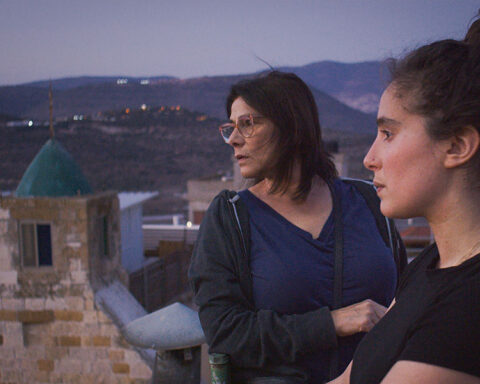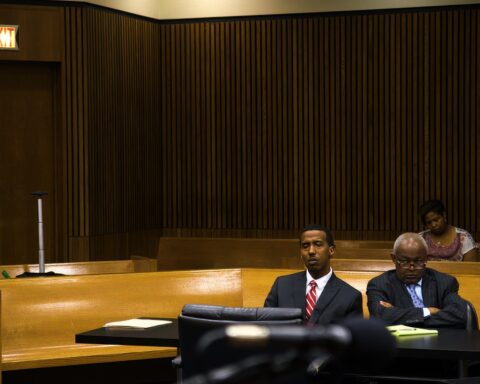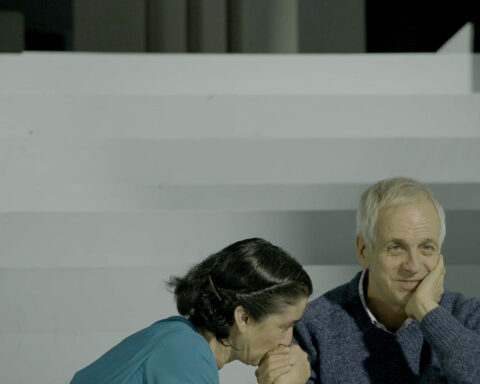EVERY TIME I MENTION HIS NAME to someone they scratch their heads and then ask if I mean the late American comedian, Alan King. Ironically, that only confirms Canada’s Allan King is unquestionably one of our greatest unknown treasures, the undisputed Godfather of Documentary Film.
Still, it bothers me that there are generations of filmmakers who have no idea of the rich and groundbreaking legacy of documentary films that King and his peers, Frederick Wiseman, the Maysles’ brothers and D.A. Pennebaker created. Variously called cinema-verité, cinema direct and actuality drama, films such as King’s Warrendale and A Married Couple were too controversial for the networks that commissioned them (CBC and CTV) but won awards and acclaim at the Cannes, New York and London film festivals.
I saw Warrendale and A Married Couple in theatres in 1967 and 1970 respectively, and was as powerfully affected then as I have been in recent screenings. And I was intrigued by the story of a filmmaker who had reached some of the highest peaks of renown and yet went bankrupt and quit directing documentaries for more than twenty years after the resounding failure of Come On Children in 1973.
Come on Children was an innovative and shockingly vivid documentary experiment contrived by putting a group of disaffected and drug abusing teenagers (including Alex Zivojinovich aka Alex Lifeson, latterly the lead guitarist of Rush) into a house in the country with only a cameraman and sound recordist for company. The film was so badly received that King’s company went into receivership and he quit making documentaries.
“It was as if I had walked in and shat on the floor,” laughs King. He turned his talents to drama for television and film, making features such as Who Has Seen the Wind, Termini Station and Silence of the North and dozens of television episodes for such franchises as Alfred Hitchcock Presents, Danger Bay, Road to Avonlea and Kung Fu: The Legend Continues. Most of this work was neither demanding nor creatively fulfilling but it was more lucrative than documentaries and King had obligations from two marriages and in the ’80s, a new wife and another child.
Finally returning to his preferred form in 1999, King scored a critical success with The Dragon’s Egg, a documentary feature about post-glasnost Estonia’s struggle to reassert its ethnic identity. Well into his seventies and still struggling to make ends meet, King had lost none of his indefatigable passion and energy for making documentaries that have a purity and integrity that was becoming increasingly rare in the New World of reality TV and mega-buck Michael Moore diatribes.
King’s compassion, his research and intellectual thoroughness were all in evidence in his next two superb feature-length documentaries, Dying at Grace (2003) and Memory: For Max, Claire, Ida and Company (2005). Using an unorthodox directing style—King is rarely present when filming takes place—the old master assembled a new team, with the main collaborators being cinematographer Peter Walker and editor Nick Hector. Both films are meditations on aging and dying and it’s a tragic coincidence that, in this same period, King has seen the passing of his dear friends, cinematographer Richard Leiterman and, just recently, Peter Walker.
Memory: For Max, Claire, Ida and Company will have its broadcast premiere on TVO early in 2006, marking Allan King’s 50th year as a filmmaker. It’s a luminous film about people who were losing or had lost a significant degree of their cognitive function due to old age, strokes, Alzheimer’s and dementia. “The film really came to me after Dying at Grace had been finished,” says King. “It is probably even more frightening than dying. The loss of identity is the most terrifying loss that we face.
“In a sense it’s about dying in another particular way. That is to say, over a period of time, one is in the process of dying, and one’s brain becomes disabled…(possibly) by a stroke and there’s a whole cluster of difficulties that are occurring…Everybody I speak to thinks, ‘what an awful thing to make a film about, what a terribly depressing thing to make a film about.’ I don’t think the film is depressing at all. I don’t find the people depressing, I find them utterly fascinating.”
In the style of King’s acknowledged master works Warrendale, A Married Couple and Dying at Grace, Memory is an actuality drama seen through the patient and revealing lens of cinematographer Peter Walker. Like all of King’s films, it is an exploration of the human condition that reflects his own lifelong concerns about the manner in which we live and die.
As producer and director, King faced an enormous challenge in making a documentary film featuring subjects who have difficulty communicating with their families and caregivers. Since King chose not to use narration or interviews to tell the story of Memory, the film presented particular problems for the production team. King’s expectations for his key collaborators are quite high.
Nick Hector, who has employed his brilliantly intuitive editing skills in documentary film for more than 20 years, says he decided to devote his energies to documentaries after seeing Allan King’s A Married Couple. Hector has edited King’s films since 1998 when he took over Dragon’s Egg. Working with King has been an exhilarating and extremely demanding job.
“His ideas percolate even while he’s working on the current film, “ says Hector. “Since I first worked with him on Dragon’s Egg, I guess he assumed I’d be editing all his films—which of course I’m happy to do… I love working with him because he doesn’t micro-manage. He makes it clear he has an idea to explore and then he brings people on board and gives them more freedom than I’ve ever experienced working on a film. It’s not that he’s laissez-faire. If you don’t deliver he’ll get rid of you.”
“For an editor,” continues Hector, “the creative freedom…(and) the responsibility is enormous. He paints a picture of the idea he wants you to explore and gives you complete freedom within the parameters of that picture he has drawn.”
Getting consent from the variously abled subjects of Memory was just the beginning of the film’s dilemmas. “They are still the same person. So if you tell them you’re making a film about dementia or Alzheimer’s or cognitive change or whatever, they say, ‘what is that?’” comments King.
“So I don’t do it. It’s totally counter- productive. What I did say is, ‘we’re making a film about this place, Baycrest, and this neighborhood and this floor,’ and we’d like them to take part in it. We’d like to film what the experience is like of living here and being here, which in truth is exactly what it’s about.
“I avoided language which I find automatically carries with it a pejorative tone—a diminishing, disabling tone. And it would be like talking to them as if there was something wrong with them, that they were in some way crippled. ‘What’s it like to live here when you’ve got a crippled brain?’”
THE FILM THAT RESULTED FROM SIXTY DAYS OF SHOOTING AND MANY MONTHS OF PLANNING AND ORGANIZING IS SURPRISINGLY LIFE AFFIRMING, HUMOROUS AND INFORMATIVE. MEMORY IS EVERY BIT AS PENETRATING AND COMPASSIONATE AS KING’S FILMS ABOUT CHILDHOOD, ADOLESCENCE, MARRIAGE AND DEATH.
Though the film stumbled along into production for weeks and weeks without seeming to gel, threatening to collapse at several points, the filmmakers’ patience was ultimately rewarded. When King asked Hector to cut a promo before he’d even assembled a rough cut, the essence of the film began to emerge. In the rich and sometimes heart-rending moments that they discovered in producing the promo, the filmmakers could see Memory beginning to take shape.
In the process, King found most of his own research-based preconceptions about aging and dementia turned upside down.“The fact is everybody is afraid of losing their mind and probably the best way to manage that fear is to look at it as it actually is…I find that what people are denying is that people who have lost their minds, or are losing their minds, are still human,” maintains King. “We always want to make people who are other than us into a less than human group and people who are said to be demented are supposed to be less than human…(We’re told that) they’ve lost their minds, but they haven’t in fact lost their minds.
“There’s a huge misunderstanding— misinterpretation—in the very word dementia…They’re still human, they’re very, very vivid. Because they are retreating in old age into childhood experience, childhood temperament, they are as emotionally vivid as children are.”
King’s empathy, and that of his creative team, is extraordinary. Using the painstaking verité methodology, they grew to understand their subjects quite well. “When they (Memory ’s subjects) feel able to pull themselves out of the lethargy into which they are pushed, which they fall into because they are left on their own and lack stimulus and all of that, and get angry because they’re handled that way, that freedom of expression and freedom of emotionality is enormously attractive and fascinating,” declares King.
“And it’s interesting listening to a woman who was willing to talk,” continues King. “I could understand everything she is saying emotionally without understanding a word of what she’s actually saying. That’s fascinating, and that’s an experience I haven’t had. And I think the audience will have cause to re-look at and reflect on what it is they’ve been thinking and seeing.”
For the editor, King’s style presents particular challenges, beginning with a great deal of footage that at first glance seems less than useful.
“When I started cutting stuff it was really hard—brutal—these ten minute cycles of repetition…but there were these great moments,” says Hector. “Although his films appear as fly-on-the-wall, he has very particular rules about honoring time and space, so the audience doesn’t feel the film has been manipulated…He always wants the audience to experience the film for themselves.
“With both Dying at Grace and Memory, the films are pretty much as I cut them with some minor changes. The great thing is I’m still learning from Allan even after twenty years of editing…In Memory there were some trims I wanted to make, just little moments, but he didn’t (let me)…And when the film played to an audience—like at the Toronto International Film Festival—those moments were the ones the audience reacted most strongly too. So he was right.”
“With Memory,” adds Hector, “I had more confidence in the early stages that we had a film. I sensed the rest of the production team didn’t think we had a film there. There was even talk we might have to use narration or interviews to move the film along, but of course that was not the case.”
When I interviewed King on the eve of the announcement of Memory ’s selection for the 2005 Toronto International Film Festival, he was in exuberant spirits despite being forced to spend long hours lying on the couch in his bathrobe because of back problems.
He was happy with the way his film turned out and soon learned of its selection for the Berlin Film Festival. But at 76 years of age, Allan King was still working on getting yet another project off the ground and trying to distribute and sell his substantial catalogue. His beloved son August had just left home for McGill University and his wife Colleen Murphy would be taking a job as playwright in residence at the University of Regina. So what does he fear at this point, if not death or losing his mind?
“I’ll run out of money. I won’t be able to support Colleen, (or) she won’t be able to support me and we’ll end up in a basement,” King pauses. “Actually I don’t care; I couldn’t care less…I’d be quite happy to move into a basement and live on my pension and Colleen and I can eat whatever… I hate asking for things. I can ask for anything if it’s for a film, but for me I don’t like doing it. So all of those things I worry about.”











